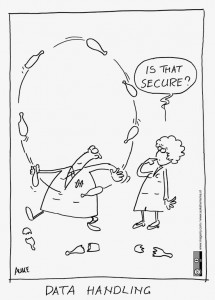Please note: many of the links in this post are internal only.
In recent years, an increasing number of funders have mandated the submission of a Data Management Plan (DMP) either during the bid stage or at the beginning of a project. Most recently, the European Commission has implemented a research data pilot through the funding stream Horizon 2020 which requires projects in a number of research areas to produce a DMP. For more information on funders’ requirements for DMP, see the OU intranet pages on Data Management Plans.
While funder mandates are clearly a very good reason to write a DMP, in this post I’d like to highlight some other benefits of planning for data management for you and your team. It turns out Mary Poppins was right – beginning your project with a DMP will save you time, energy and stress – so well begun really is half done.
1. More share-able data
The expectations of researchers to publicly share their data are growing, and sharing your
data can have significant benefits for you as a researcher. However making your data understandable and usable for a third party user can be time-consuming work. You will need to organise your data in a logical way, with meaningful file na mes and structures and plenty of good quality documentation. The good news is that by planning ahead and understanding how to organise and describe your data in a way that enables re-use, you will be able to integrate these processes into your day-to-day research practice, thereby saving a lot of time and stress at the end of your project when you want to share.
mes and structures and plenty of good quality documentation. The good news is that by planning ahead and understanding how to organise and describe your data in a way that enables re-use, you will be able to integrate these processes into your day-to-day research practice, thereby saving a lot of time and stress at the end of your project when you want to share.
2. Smoother collaborative working
One of the key elements of a good DMP is detailed description of roles and responsibilities. Designating roles and responsibilities for RDM across the research team at the beginning of the project will help make your research data more consistent, efficient and accurate. You might want to assign the following tasks:
- Designing data collection sheets
- Checking field data recordings
- Designing spreadsheets and databases
- Data entry
- Ensuring data quality
- Assigning metadata
In addition to roles and responsibilities, deciding on consistent procedures at the beginning of your project which everyone is expected to follow for everyday activities such as file naming, versioning, completing data collection sheets and transcription will help maintain consistency and increase efficiency, as less time will be spent looking for files and trying to navigate your colleague’s “unique filing system”!
Research data is a valuable asset, and should be treated as such. In many cases, research data will be sensitive and should not be accessible to anyone outside of the research team (prior to anonymisation and publication). At the planning stage you should make sure you are aware of the security issues surrounding research data management and create strategies and procedures to ensure that you are taking appropriate security measures for the data which your are creating. Failure to do so could result in a serious security breach which could affect both your reputation and that of the university.
For advice on writing a data management plan, consult your faculty research support team or email rdm-project@open.ac.uk.
 Or why not try using DMPOnline? This fantastic tool created by the Digital Curation Centre has now been customised by the OU.
Or why not try using DMPOnline? This fantastic tool created by the Digital Curation Centre has now been customised by the OU.


